Why Surety Companies Require Financial Statements
May 13, 2021

- If your customer needs a surety bond then they may be required to submit both personal and business financial statements during the bond application process. This often comes as a shock to first time surety buyers, as rarely do other lines of insurance utilize financial statements in the underwriting process. People generally don’t like disclosing their financial information, as it tends to be a topic avoided in polite conversation. Increasing this level of discomfort is the fact that your customer is providing detailed descriptions of their personal and business finances to total strangers. There is; however, a very good reason why surety companies need access to this information, and it goes to the very heart of why your customer needs a surety bond in the first place. In this week’s blog article, we provide inside information into why surety companies require financial statements, and give insurance agents the tools needed to effectively service their surety customers.
What is a Surety Bond?
To fully understand why surety companies require financial statements, you first need to understand the nature of suretyship. A surety bond is a three party contract between the principal (your customer), the surety company, and the obligee. The obligee requires the principal to purchase a bond, usually as a prerequisite to obtaining a business license or permit, and the surety company assumes liability in the event a claim is made against the bond. Surety bonds protect the obligee from financial harm in the event that the principal violates the provisions set forth in the bond form.
What is Indemnification?
Unlike other types of insurance, a surety principal must repay the insurance company for any losses resulting from a claim being made against the bond. Indemnification holds the principal legally liable to repay the surety company for any losses, and is generally codified in the legislative statutes requiring the bond. Indemnity agreements drastically change the underwriting requirements for surety bonds. Underwriters must not only examine the likelihood the principal will have a claim filed against their bond, but also their ability to repay the surety company were a claim to occur.
Why Do Surety Companies Examine Financial Statements?
As mentioned above, surety companies must determine the principal’s ability to repay them in the event a claim is filed against the bond. While a personal credit report from one of the major credit bureaus is the most commonly used tool to assess the principal’s ability to repay, particularly for bonds with lower liability limits, a review of the financial statements of the business and principal is the most comprehensive, and will be utilized on larger or otherwise riskier bond types .By requiring principal’s to submit financial statements, surety companies are able to examine factors such as the principal’s net worth and business capital. Principals with poor financial statements are less likely to be approved for a bond.
Does Your Customer Need to Have the Full Bond Amount in Assets?
Not necessarily, as financial statements are only one factor underwriters examine when determining the principal’s bond eligibility. Underwriters will also consider your customer’s credit score, years of business experience, moral character, and the historical risk of the bond. When analyzing your customer’s financial statements, underwriters will consider the following factors:
- Business revenue
- Profit margins
- Working capital (current assets – current liabilities)
- Current ratio
- Equity position
When Do Surety Companies Examine Financial Statements?
Not all bonds require a review of financial statements, and whether or not your customer must submit these documents largely depends on the type of bond they need. Bonds with a historically low rate of claims are considered low risk, and surety companies will rarely examine your customer’s financial statements before issuing them. Generally speaking, principals applying for a bond with a limit of over $50,000 will likely need to submit a business financial statement during the bond application process.
Nobody likes divulging their financial status, and the frustration your customers feel when doing so is understandable. When it comes to surety bonds, the reality is there is no wiggle room in the underwriting requirements. If the surety company requires financial statements, then your customer will need to provide them if they want to obtain a bond. However, at BondExchange we will shop the market to identify the carrier with the appetite for the risk, and will not require financial statements unless all quality carriers in the market do. As an agent, you can help alleviate your customers’ apprehension towards providing these documents by educating them on why surety companies require financial statements in certain situations. Surety companies will require financial statements to determine the financial strength and stability of the client they are bonding. Ultimately, the surety’s financial review is meant to gauge the relative success of the company in its industry and the financial responsibility of its owners. In the mind of a surety underwriter, seeing a financially successful company reduces the likelihood of business failure, in turn reducing the likelihood of claims made against the bond. Insurance agents who can effectively communicate this message will find their customers are far more willing to provide these documents.
What Kinds of Financial Statements to Surety Underwriters Need to Review?
Depending on the size or risk classification of the bond requirement, surety underwriters may need to review different types of financial statements to come to a decision regarding approval of the bonded principal. For smaller bonds where financial statements are still requested, surety underwriters generally want to see the following:
- Balance Sheet – A snapshot of the company’s assets and liabilities at a point in time. This report shows what the company owns and owes.
- Income Statement – A report measuring revenue, expenses and net income for a specified period of time.
If the principal is needing to set up a larger bond line (think aggregate amounts over $1,000,000), the surety will likely want the principal to engage with a Certified Public Accountant (CPA). CPA’s can have varying levels of involvement depending on the needs of the principal:
- Compilation – a presentation of information supplied by management in financial-statement format.
- Review – consists of inquiries and analytical procedures aimed at expressing assurance that the financial statements conform to generally accepted accounting principles
- Audit – the critical evaluation of financial statements to form the basis for an opinion on the financial statements taken as a whole
Lastly, a surety underwriter may request a Personal Financial Statement in addition to the Business Financial Statements described above. The Personal Financial Statement mirrors the business’s balance sheet; however, only includes the owner’s individual assets. The principal can utilize a template such as the one depicted below or have one created by their bank or accountant.
How Can an Insurance Agent Obtain a Surety Bond?
BondExchange makes obtaining a surety bond easy. Simply login to your account and use our keyword search to find your bond in our database. Don’t have a login? Enroll now and let us help you satisfy your customers’ needs. Our friendly underwriting staff is available by phone (800) 438-1162, email or chat from 7:30 AM to 7:00 PM EST to assist you.
At BondExchange, our 40 years of experience, leading technology, and access to markets ensures that we have the knowledge and resources to provide your clients with fast and friendly service whether obtaining quotes or issuing bonds.


